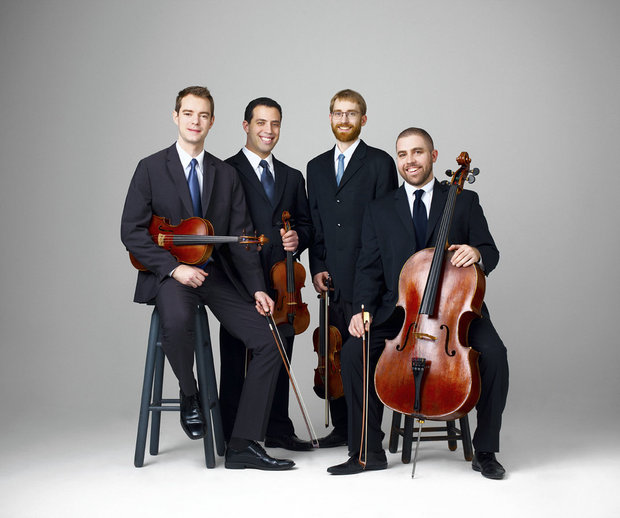Review: Jack Quartet in Concert
03/03/16

Zachary Lewis - The Plain Dealer
CLEVELAND, Ohio – Music critics love to call concerts unforgettable. In this case, however, I'm not exaggerating.
That's because the performance Tuesday by the JACK Quartet at the Transformer Station wasn't strictly a (brilliant) musical or even auditory event. It was an all-encompassing, multi-sensory physical experience.
Never in the concert hall have I worked so hard. Sitting for an hour in the dark – in the complete absence of light – through Georg Friedrich Haas' String Quartet No. 3 required the sort of stamina more commonly demanded by "Stretching Out," my fitness column.
But the effort was worthwhile. In the darkness, the JACK players cleansed our minds and ears, leading me and a handful of Cleveland Museum of Art patrons across an absorbing, prismatic soundscape they wouldn't have been able to conjure in the light.
To answer a few basic questions: The musicians performed the work from memory. Stunning, I know. Much, too, was improvised. The artists communicated and made decisions on the spot through musical code. They sat in the four corners of a small room, with the audience (tacitly relieved by a sign of its right to sue) in the center. All light was shut out; Even emergency and ambient sources were covered. Phones weren't just to be in airplane mode. They had to be turned off completely.
My immediate instinct was to flee. During the test-moment of darkness before the performance, my heart and breathing rates spiked, and I began to sweat, feeling instant, intense claustrophobia. And I'm not normally claustrophobic. Everyone, though, ended up staying, including me, after rolling up my sleeves to cool down and placing my chair along a comforting wall near the exit.
The music, while not exactly soothing, helped, giving my agitated mind something on which to focus. Before long, my brain quieted, I fell into a trance-like state, and the piece, composed in 2001 and subtitled "In iij. Noct." in reference to an old Catholic service, became my everything.
Thankfully, it was plenty. Half of Haas' score was the stuff of scary movies, sounds one would have sworn were electronic: creaking doors and stairs, ghoulish screams, braking trains, groaning trees, faint cackles and whispers.
The other was meditative: chirping like birds in some dark rainforest; drones sliding up and down by microtonal degrees, slipping in and out of harmonic alignment; wide, rapturous chords; a heavenly snippet of Gesualdo. Sounds materialized and evaporated without their sources or locations ever being revealed.
The transition back to reality was mercifully gentle. After the last notes faded away, several minutes of welcome silence ensued, followed by a gradual raising of the lights.
It was then, during applause, that the piece's effects on me crystallized. Deprived of sight for an hour, I realized I'd channeled all my attention inward. I felt refreshed and mentally expunged, as one might after meditating, as well as physically empty and loose.
More than anything else, though, I felt the urge to write, to record my impressions on paper. Not because I had any fears of forgetting them. No risk of that. Rather, I wanted only to quickly and vibrantly share the experience with others.


